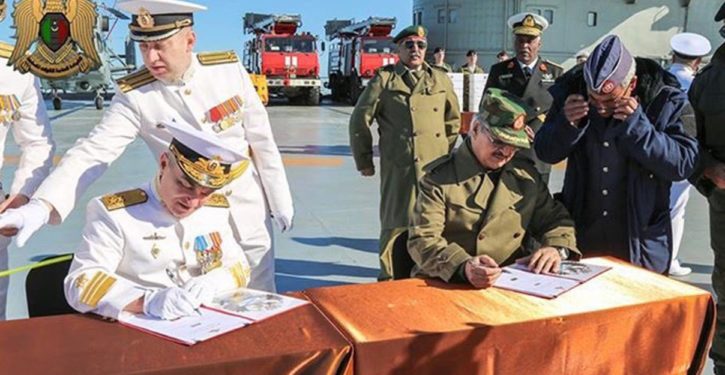A massive US buildup of its military is needed, 8 yrs of the US being in retreat under Obama has emboldened its traditional enemies.
So the caissons are rolling along on this Russian move, and the new special forces deployment is just the latest development. Russia denies the deployment, but Russia denied putting special forces into Ukraine, and we know how that turned out. Putting Russian forces at an Egyptian air base isn’t just about the convenience of existing infrastructure; it’s about logistics, and moving material support for Haftar into Libya. Russia and Egypt will formally deny it, until they don’t. When they don’t, Russia will be able to make deliveries directly to Libyan ports.
I hope the old, outdated reflexive responses are mostly drummed out of folks by now. Russia isn’t getting into a quagmire by doing this – not even with the remaining problem of an Islamist-threatened western Libya to solve. You can only get into a quagmire in a place you don’t mean to stay in. And Russia means to stay.
Russia makes play for Libya
The play Russia is making for Libya broke into American consciousness this week, with a report from Reuters that Russia has deployed special forces to an air base in western Egypt, from which to support Libyan military commander Khalifa Haftar.
Haftar, 73, is a long-time Libyan military commander who helped bring Qadhafi to power in 1969, but ended up in the U.S. after he became a prisoner of war in Libya’s 1987 conflict with Chad. Haftar was in America for 20 years, becoming a U.S. citizen. In 2011, he returned to Libya after the Arab Spring meltdown and participated in the overthrow of Qadhafi. Although he eventually came back to the U.S., he returned to Libya in 2014 when the first post-Qadhafi national unity government was dissolved, and reinvolved himself in Libyan politics and military activity.
Haftar became military commander in 2015 for a newly recognized unity government in Tobruk. But the U.S. and major EU nations ended up backing the Government of National Accord, a separate entity with its power base in central and western Libya, in December of that year. The GNA and Haftar, head of the Libyan National Army (LNA), have coexisted uneasily in the months since, with their power relations revolving around outside patronage, control of the oil and gas infrastructure, and posture vis-à-vis ISIS and its adherents along the Mediterranean coast, and the Islamist-dominated “National Salvation Government” holding pockets of territory in the west.

Fortunately, the rest of this will be easier to visualize and understand. Russia is backing Haftar, who in the last few months has cleared Benghazi of rebels and seized back key petroleum infrastructure, putting it under positive control and making it increasingly useful for commerce again. Haftar hasn’t been making overt moves against the GNA, but neither will he agree to a formal accord with it. Haftar’s Libyan National Army, with its military success and territorial holdings, makes him a necessary component of a Libyan settlement.
Enter Russia. Americans, who rarely ever have to worry about the dictatorship of geography, can never really grasp this, but Russia’s interest in Libya is not primarily about oil. It is about oil, but it’s primarily about geography. The coast of Libya commands much of the central Mediterranean – which is not a wide-open maritime playground, but a chokepoint, narrow and easily spanned by missiles, small ships, and patrol aircraft, between Europe (Italy) and Africa (Libya, Tunisia, and Algeria).
Oil and gas are important to have, but they are all over the place. Russia is surrounded, and lives and dies by maritime chokepoints. What’s interesting is when a key chokepoint that flanks Russia’s rich, economically powerful European neighbors, and enables her to dominate the Mediterranean Sea, is awash in oil. That’s a place worth moving in on, and sitting on for as long as it takes to realize all its potential.

